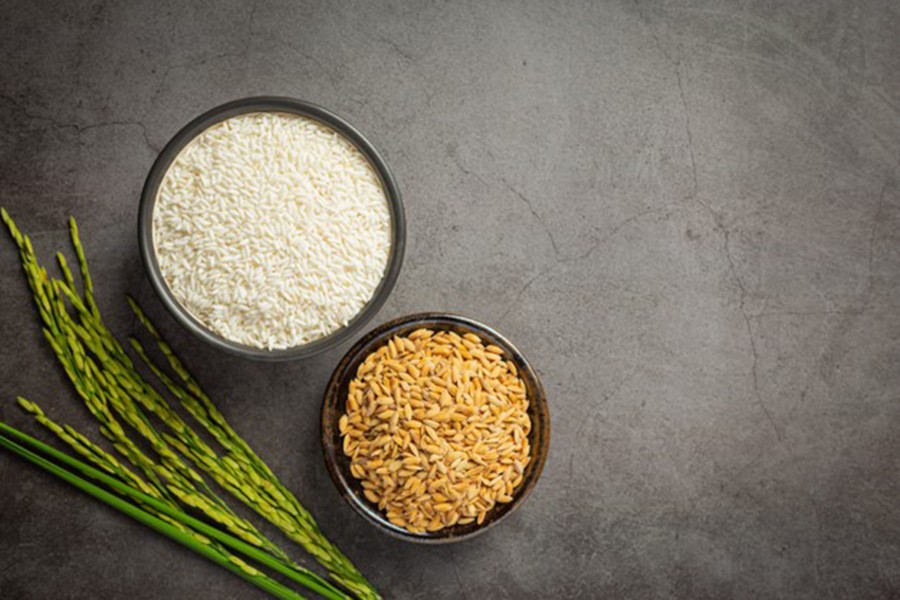The prices of rice and paddy have started increasing notably at milling hubs in the country even during this Boro harvesting season.
Such a hike in the prices of rice and paddy is a matter of concern for the government as it might hurt its food grain procurement drive which is going on in full swing.
The prices of both paddy and rice went up by Tk 3.0-5.0 per kilogram in a week in hubs like Kushtia, Naogaon, Pabna, Dinajpur, Rangpur, and Nilphamari.
As a result, the food department has asked its regional offices to bring wholesalers and traders under strict monitoring to avert any artificial price hike, said the officials.
Hybrid paddy price increased to maximum Tk 850 a muand, medium variety BRRI dhan-28 to Tk 950 and finer quality Zira/Minikit to Tk 1,100 a maund in a week in rice growing hubs-up by Tk 120-200 per maund, according to Bangladesh Auto Major Husking Mill Owners Association (BAMHMOA).
Hybrid rice was sold at Tk 38-39, BRRI dhan-28 rice at Tk 46-47, Zira or Minikit at Tk 50-52 a kg at Naogaon, Nilphamari, Kushtia, and Dinajpur mills on Saturday---a Tk 3.0-4.0 hike in a week.
BAMHMOA secretary K M Layek Ali told the FE that millers have started buying paddy in large volume for their market operation for the next two months, resulting in a price rise to some extent.
He said both the millers and the government are now procuring paddy which has caused the hike in its price.
As per their prediction, Mr Ali said, rice production might drop slightly in many places during this Boro season.
A high official at Directorate General of Food (DGoF) said the office has directed its regional food controllers to bring wholesalers and traders under scrutiny following rising prices of paddy and rice during this Boro harvesting period.
The price hike in such margin is worrisome for the public food procurement while the country is expecting a good harvest, he said, adding that the regional food controllers have been directed to prevent rice trading without any licences.
The wholesalers and seasonal traders (paikers) should be given licences compulsorily. The officials will have to collect all relevant papers from wholesalers of their seven-day transactions, he said.
And the documents should be sent to supply, distribution, marketing and procurement divisions under the directorate, the official said, adding that public procurement is going on in full swing as over 23 per cent of the target has been achieved in a month until June 1.
He mentioned that 0.443 million tonnes of grain including 0.264 tonnes of rice, 0.116 million tonnes of paddy and 0.063 million tonnes of wheat have been purchased so far.
DGoF said it has set a target to purchase 1.9 million tonnes of grain including 1.0 million tonnes of parboiled rice, 0.15 million tonnes of white rice, 0.65 million tonnes of paddy and 0.1 million tonnes of wheat during this Boro season from April 28 to August 31.
The directorate raised the asking prices for both paddy and rice this Boro season. It failed to achieve the target during the last Aman season due to higher prices of rice and paddy in the market than the government-fixed rates.
However, local procurement as well as imports has helped the government increase its food stock to nearly 1.0 million tonnes in June which declined to a decade low of 0.4 million tonnes in April last.
Agri economist Prof Golam Hafeez Kennedy said market prices of coarse rice are still below Tk 38 a kg in the milling hubs against the government's purchase rate of Tk 39-40 a kg.
Hybrid paddy prices are still below Tk 23 a kg against the government's buying rate of Tk 27 a kg." A further hike by Tk 2.0 a kg might severely affect the public procurement," he added.
Mr Kennedy said the government will have to get ready to review the prices anytime to fulfil its procurement target. It is very crucial for food security when the country is expecting a third wave of the pandemic, he added.
However, food expenditure should be increased notably for the next fiscal year following the global food price trend which is now a decade-high.
He said public warehouses must have a stock of at least 1.5 million tonnes of food grain to deal with any odd situation.
The agriculture ministry is expecting an all-time high of 20.5 million tonnes of rice production this Boro season from 4.87 million hectares of land.
Boro production remained almost static at 19.6 million tonnes during the period between 2018 and 2020.
The season comprises 56-57 per cent of the total rice demand.
However, the prices of rice started increasing in Dhaka wholesales too, but yet to put any impact on its retail market.
Rice prices almost remained static at previous high as coarse varieties were retailed at Tk 48-50, medium at Tk 54-56, finer at Tk 62-72 a kg in Dhaka on Saturday.
Mohammad Asadullah, a Badamtoli-Babubazar based trader in the city, said prices of rice showed a slight decline only for three weeks in May and then started rising again.
Rice price will go up in the retail market within a few days when the grocers' stock will run out, he added.
The Trading Corporation of Bangladesh (TCB) data showed that current prices of coarse and medium varieties of rice are 10-13 per cent higher than that of last year.


